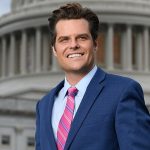In the ever-changing landscape of American politics, the winds of change are blowing vigorously, especially with recent updates from South Dakota stirring discussions about a prominent cabinet decision. South Dakota Republican Senator John Thune has stepped up to share insights on this unfolding drama, leaving many curious about the implications of this latest move.
Thune expressed that President-elect Donald Trump had to make a tough call regarding his cabinet nominations, a decision that could be interpreted as both wise and necessary. It was suggested that new information may have influenced the President’s reversal of one nominee, presenting an opportunity to select another candidate. Thune firmly believes that there are plenty of qualified individuals eager to contribute to the administration’s agenda, and he looks forward to a fresh start with a capable team.
While some chatter in Washington speculated that these decisions might have been strategic moves to clear the way for other controversial nominees, Thune dismissed those theories as mere talk. He emphasized a bipartisan approach aimed at ensuring the President surrounds himself with the best possible talent. The noble task of providing advice and consent is one that Thune takes seriously, advocating for the administration’s successful functioning while remaining vigilant in governmental responsibilities. His overarching message was one of support for the President’s team and hope for a united effort in pushing the nation’s agenda forward.
However, it’s not all smooth sailing. Thune had some stern thoughts about the current state of federal bureaucracy, particularly regarding education. He discussed a significant piece of legislation introduced by fellow South Dakota Senator Mike Rounds aimed at dismantling the federal Department of Education. Rounds proposed redirecting decision-making powers back to states and local tribes, arguing that this approach would better serve students’ needs than an “oversized bureaucracy” in Washington, D.C.
In a humorous turn, Thune pointed out how the size of cabinets has grown over the decades, making past presidents’ kitchen tables look like cozy family gatherings compared to today’s sprawling bureaucratic banquets. He noted that despite spending approximately $16,000 per student annually, educational outcomes have stagnated or declined. Thune called for getting bureaucrats out of classrooms and allowing local decision-makers to take charge. He believes returning power to local communities could lead to significant savings and foster better educational outcomes.
While challenges lie ahead, Thune remains optimistic that a thoughtfully selected team could spearhead policy restructuring and pave the way for effective governance. Questions remain about executing this ambitious plan, but there’s no doubt that discussions are just beginning. In the world of politics, where surprises and plot twists are part of the game, South Dakota is firmly in the mix, bringing both hope and humor to the table—literally!




